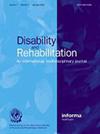Carers in post-stroke aphasia: a scoping review of interventions and outcomes beyond communication partner training.
IF 2.1
4区 医学
Q1 REHABILITATION
引用次数: 0
Abstract
PURPOSE Carers of people with aphasia face unique challenges. Research has demonstrated that these carers have a higher burden of care and more negative stroke-related outcomes in comparison to carers of stroke survivors without aphasia. The aim of this scoping review was to map the range of interventions for carers other than communication partner training and to examine their outcomes. MATERIALS AND METHODS We conducted a scoping review on this topic. RESULTS Twenty studies were included. Most studies were case series with four randomised control trials. Both quantitative and qualitative approaches were used. Most studies occurred during the long-term phase of care. Two interventions had only carers as participants. Interventions were comprised of different combinations of intervention components including psychoeducation, skill-building, and support. There was high variability on who led the interventions, the format, and the dose/schedule. Twenty-eight different outcome measures for carers and dyads were used across various domains with overall positive outcomes post-intervention. CONCLUSIONS This review uncovered a wide range of formats, dosages, and outcome measures in interventions for carers. Encouragingly, the majority of these interventions included psychoeducation, skill-building, and support components. While most studies were case series, there are promising interventions that have the potential to enhance carer wellbeing.卒中后失语症患者的照护者:对交流伙伴培训之外的干预措施和成果的范围界定综述。
目的失语症患者的照护者面临着独特的挑战。研究表明,与没有失语症的卒中幸存者的照护者相比,这些照护者的照护负担更重,与卒中相关的负面结果也更多。本次范围界定综述的目的是了解除交流伙伴培训以外的护理者干预措施的范围,并研究其结果。材料与方法我们对该主题进行了范围界定综述。大多数研究为病例系列,其中有四项随机对照试验。研究采用了定量和定性两种方法。大多数研究发生在长期护理阶段。有两项干预措施的参与者仅为照护者。干预措施由不同的干预内容组合而成,包括心理教育、技能培养和支持。干预的主导者、干预的形式以及干预的剂量/时间安排存在很大差异。针对照护者和照护组合的 28 种不同结果测量方法被用于不同领域,干预后的结果总体上是积极的。令人鼓舞的是,大多数干预措施都包含心理教育、技能培养和支持等内容。虽然大多数研究都是病例系列,但有些干预措施很有前景,有可能提高照护者的福祉。
本文章由计算机程序翻译,如有差异,请以英文原文为准。
求助全文
约1分钟内获得全文
求助全文
来源期刊

Disability and Rehabilitation
医学-康复医学
CiteScore
5.00
自引率
9.10%
发文量
415
审稿时长
3-6 weeks
期刊介绍:
Disability and Rehabilitation along with Disability and Rehabilitation: Assistive Technology are international multidisciplinary journals which seek to encourage a better understanding of all aspects of disability and to promote rehabilitation science, practice and policy aspects of the rehabilitation process.
 求助内容:
求助内容: 应助结果提醒方式:
应助结果提醒方式:


